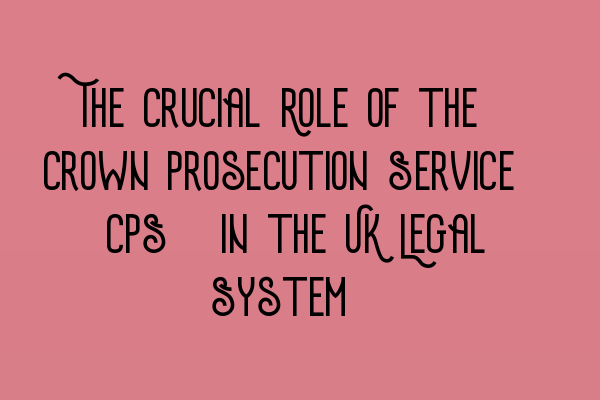The Crucial Role of the Crown Prosecution Service (CPS) in the UK Legal System
Welcome to the blog of SQE Criminal Law & Practice Law UK! Today, we’ll be diving into the crucial role played by the Crown Prosecution Service (CPS) in the UK legal system. The CPS is a vital component that ensures the smooth functioning and delivery of justice in criminal cases. Whether you are studying for the SQE 1 or SQE 2 exam, understanding the significance of the CPS is essential. Before we delve deep into its role, let’s briefly explore what the CPS is.
What is the Crown Prosecution Service (CPS)?
The Crown Prosecution Service (CPS) is an independent public prosecution service in England and Wales. Its primary function is to prosecute criminal cases on behalf of the state. The CPS works closely with the police, courts, and legal professionals to ensure that the right individuals are brought to justice. As a crucial intermediary, the CPS bridges the gap between the investigative stage and the courtroom proceedings.
The Role of the CPS in Criminal Cases
The CPS plays a multifaceted role throughout the criminal justice process, starting from the moment an alleged offense is reported to the police. Let’s take a closer look at its key responsibilities:
Reviewing and Deciding on Charges
The CPS reviews the evidence gathered by the police and assesses whether it is in the public interest to proceed with the case. This involves determining whether there is enough evidence to provide a realistic prospect of conviction and whether the prosecution is necessary and proportionate. The CPS’s decision-making process is guided by the Code for Crown Prosecutors, ensuring fairness and consistency.
Preparing and Presenting Cases
Once the decision to prosecute has been made, the CPS is responsible for preparing the case for trial. This includes examining witness statements, assembling evidence, and seeking expert opinions if necessary. The CPS also represents the prosecution in court, presenting the evidence and examining witnesses to support the case. Their expertise in criminal law and trial advocacy is invaluable in securing convictions.
Working with the Defense
The CPS is committed to upholding the principles of fairness and impartiality. As part of this commitment, they are required to disclose all relevant material to the defense, known as the “disclosure duty.” The CPS must ensure that the defense has access to the evidence that may assist their case or undermine the prosecution’s case. Collaboration and adherence to procedural rules are key in maintaining the integrity of the criminal justice system.
The Indispensable Nature of the CPS
The Crown Prosecution Service plays an indispensable role in the UK legal system. Without the CPS, the criminal justice process would be fragmented, and the delivery of justice would suffer. Let’s explore the significance of the CPS in more detail:
Expertise and Specialization
The CPS consists of highly skilled and specialized prosecutors who possess a deep understanding of criminal law, evidential sufficiency, and trial advocacy. Their invaluable knowledge ensures that cases are handled competently and effectively, increasing the probability of successful prosecutions. This expertise also extends to dealing with vulnerable witnesses, ensuring their voices are heard and their rights protected.
Public Confidence
The CPS plays a crucial role in maintaining public confidence in the criminal justice system. By diligently reviewing and assessing evidence, the CPS ensures that only cases with sufficient evidence and public interest are prosecuted. This selection process helps prevent unjust prosecutions and enhances public trust in the legal system.
Supporting Victims and Witnesses
The CPS is dedicated to supporting victims and witnesses throughout the legal process. Their involvement ensures that victims are treated with respect and empathy, providing them with the necessary information and support. In cases involving vulnerable witnesses, the CPS takes additional measures to protect their well-being and aid their participation in court proceedings.
Promoting Fair Trials
The CPS’s commitment to fairness extends beyond presenting cases in court. They are also responsible for monitoring the conduct of prosecutions and raising concerns if they believe that a miscarriage of justice has occurred. By upholding an unwavering commitment to fairness, the CPS plays a vital role in safeguarding the integrity of the criminal justice system as a whole.
As you can see, the Crown Prosecution Service (CPS) is an integral part of the UK legal system. With their expertise, fairness, and dedication to justice, they ensure the smooth functioning of criminal cases. Whether you’re preparing for the SQE 1 or SQE 2 exam, understanding the role of the CPS is essential. For more information, check out our SQE 1 Practice Exam Questions and SQE 1 Practice Mocks FLK1 FLK2 courses that cover relevant topics. If you’re preparing for the SQE 2 exam, our SQE 2 Preparation Courses will provide comprehensive guidance. Stay updated with the SRA SQE Exam Dates and take your legal career to new heights!
